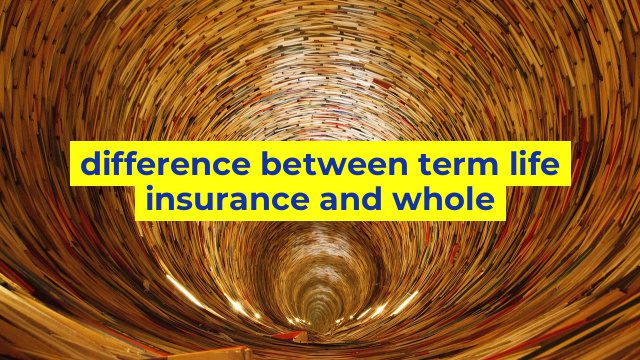Understanding the Difference Between Term Life Insurance and Whole Life Insurance
When it comes to life insurance, there are two major types of policies people can choose from – term life insurance and whole life insurance. Both policies are designed to offer financial security to your loved ones by providing a death benefit, but the key difference between these two policies is the length of coverage and the amount of investment involved.
Term Life Insurance
Term life insurance is a policy that provides coverage for a specific time period, usually ranging from one to thirty years. It is designed to protect your family from financial uncertainties in the event of your unexpected death or terminal illness. The policy provides a death benefit to your beneficiaries if you pass away within the term of the policy.
Term life insurance is preferred by those who want an affordable way to provide protection during significant life events, such as after buying a home or after the birth of a child. This type of policy ensures that the policyholder’s family is protected during the specific periods when the policy is active.
Whole Life Insurance
Whole life insurance is a policy that provides lifelong coverage with a guaranteed death benefit payout. This policy is more expensive than term life insurance and includes an investment component intended to build cash value over time. The cash value can be used for various purposes, such as borrowing money to pay for college education or starting a business.
Whole life insurance is preferred by those who want to accumulate cash value in addition to a death benefit payout. The policy offers a guaranteed rate of return and may also offer dividends or bonuses, making it an attractive option for those seeking long-term investments.
Final Thoughts
In summary, the main difference between term life insurance and whole life insurance is that the former offers temporary coverage for a specific period while the latter provides lifelong coverage with an investment component. Both policies have their pros and cons, and the choice depends on individual needs and financial goals.
If you’re looking for an affordable way to protect your family during significant life events, term life insurance may be right for you. If you prefer to accumulate cash value while protecting your family, whole life insurance may be the best option. It is essential to weigh your options carefully and work with a professional advisor to choose the policy that suits your needs best.
Table difference between term life insurance and whole
life insurance
| Term Life Insurance | Whole Life Insurance |
|---|---|
| Offers coverage for a specific term (usually 10, 20, or 30 years) | Provides coverage for the entire lifetime of the policyholder |
| Generally has lower premiums | Usually has higher premiums |
| Does not build cash value | Builds cash value over time |
| Can be renewed or converted to a permanent policy, but premiums generally increase | Does not require renewal or conversion, but can be expensive to surrender or cash out |
| Often used to provide coverage during a specific period of life, such as while children are young or a mortgage is being paid off | May be used for estate planning, long-term financial goals, or as an investment vehicle |

